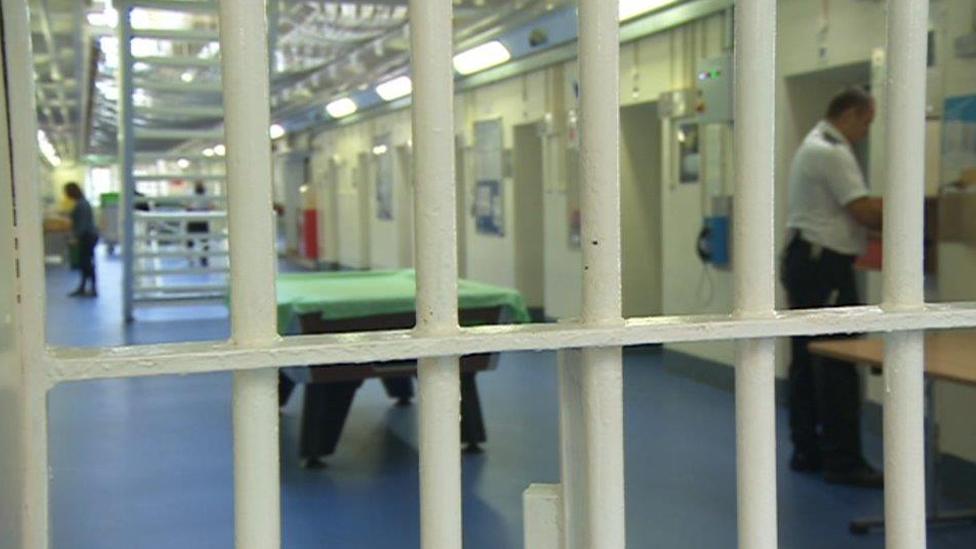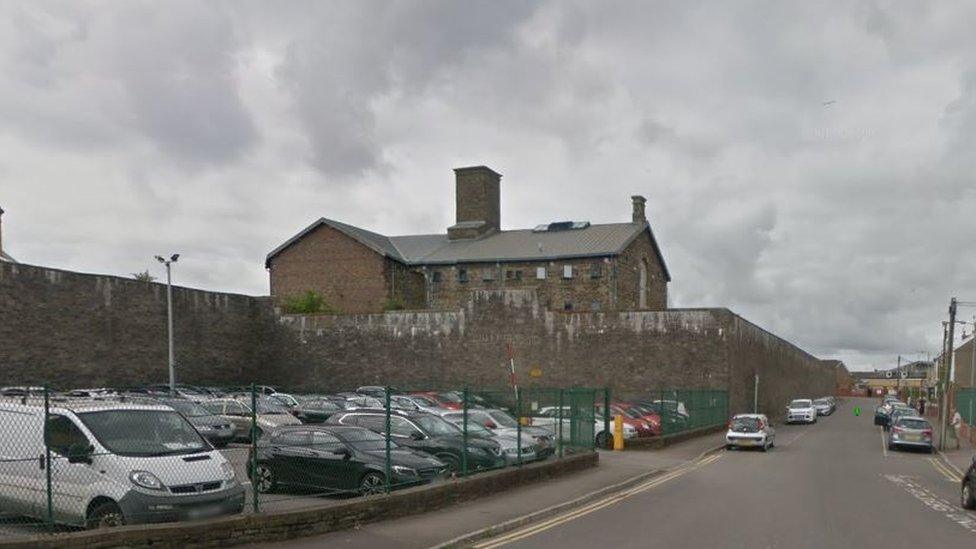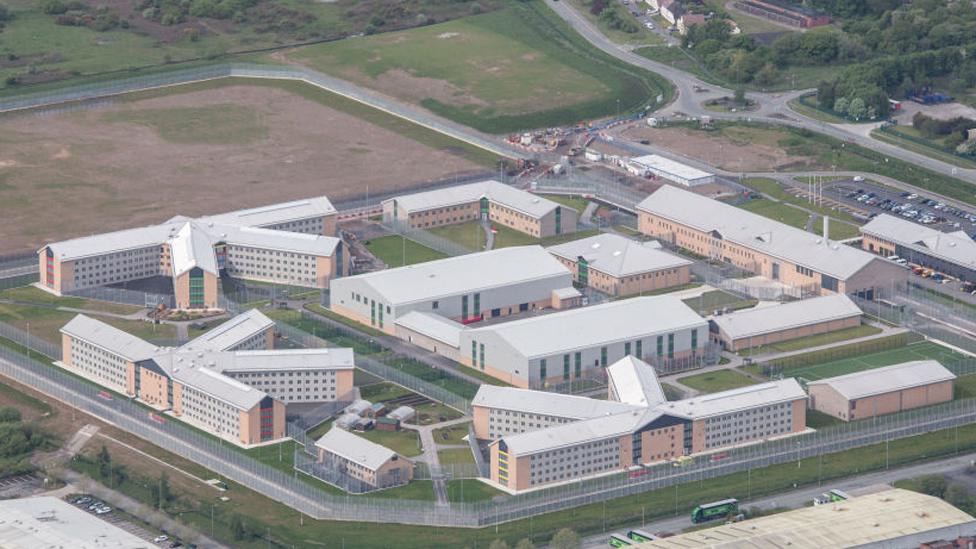Covid: 'Shut courts' call to halt prison virus spread
- Published

There has been a "massive outbreak" of Covid at Cardiff prison, seen here before the pandemic
Courts should close to help stop the spread of Covid in jails, the body representing prison staff has said.
It comes as data reveals a large rise in cases in Wales' prisons.
Mark Fairhurst, from the Prison Officers' Union (POA), said there had been a "massive outbreak" at HMP Cardiff, where they struggle to find space for new arrivals to isolate.
A Prison Service spokesman said shielding, mass testing and limited regimes were in place at all prisons.
He said these safeguarding measures were limiting transmission, and programmes to test prisoners arriving in court were being rolled out - with no plans to shut courts.
But the POA said a number of factors were having an impact:
Recalling prisoners for seven or 14 days "doesn't make sense" in the pandemic
The risk of transmission at Cardiff was increased because of transfers between prisons
Large numbers of men were unlocked at once in Cardiff, increasing the spread

Swansea prison has kept cases low
"Existing trials should be allowed to finish, but new trials should only be started if they can be facilitated through video link," Mr Fairhurst said.
"When you first come into jail you isolate for 10 days, but we struggle to find the space to do that because of pressures from the courts.
"If you closed the courts you wouldn't have to do that."
He added that excessive numbers of prisoners were unlocked at once in Cardiff - prior to the lockdown announcement in Wales.
"Swansea has kept levels low because they are following the safe operating procedures and only letting small numbers out, and it's worked."
Cases in HMP Cardiff rose from 22 in June to 110 in November and, while testing has increased in that time, HMP Swansea's cases rose from just 12 to 14 in the same period.
The rate of growth in cases in prisons is still well below the wider population.

Solicitor Melissa Griffiths says courts need to be open
The call has been met with resistance elsewhere in the sector, as the need to keep the courts open is seen as a priority.
"We're busier than ever," said criminal solicitor Melissa Griffiths, from Allington Hughes Law in Wrexham.
"Unless you're going to have a moratorium on crime, which will never happen, you need the courts to be open."
She said the dip in crime seen in March last year was short-lived and, while courts have done their best to become Covid-secure, risks were unavoidable.
"Every time you go to court is a risk - you don't know who you are coming into contact with. But if you don't have the courts carrying on it is all going to fall apart.
"You need remand courts because there will always be serious crimes committed and those people need to be remanded into custody."
She added the court closure at the start of the pandemic caused a backlog in cases that is yet to be cleared and priority is given to those in custody before "custody time limits" expire.
Criminal solicitor Scott Bowen, from HPJV Solicitors, works out of courts in both Newport and Cardiff, said closing them would have an impact on victims as well as the accused, but removing the threat of recall would have wider implications.

HMP Berwyn, the largest prison in Wales, saw the most Covid cases among staff
"If people are not complying with their sentence, do you grant them amnesty because it's a pandemic? If that message got out to repeat offenders it would be anarchy," he said.
"The probation service has to stick to policy and recall someone for a breach, because it's a deterrent to everyone."
How many coronavirus cases are there in Welsh prisons?
Figures obtained via a Freedom of Information request by criminologist Dr Robert Jones showed a 210% rise between June and November, compared with a 436% rise across Wales in the same period.
A third of all cases were at HMP Cardiff, which saw a leap to 110 positive cases by the end of November, from 22 cases in June (400% rise).
Yet cases at HMP Swansea - which, like Cardiff, is an old site taking men on remand from the local courts - rose marginally from 12 to 14.
HMP Berwyn cases rose from 41 to 61 (48%), and at HMP Parc cases increased from seven to 44 (528%).
Figures are provided jointly for Usk and Prescoed, which saw a rise from 19 to 84 cases (342%), though arguably as an open prison the risks of transmission from the community at Prescoed are greater.
Overall, cases went from 101 in June to 313 at the end of November 2020.
Dr Jones also requested data for staff working at Wales' prisons, with data being provided to the end of October 2020.
It showed a steady rise in cases, with 163 affected by the end of October 2020.
HMP Berwyn had the highest number with 66 (double that of June), HMP Parc had 31 (compared with six in June), HMP Cardiff had 30 (six more than in June), HMP Swansea rose from 10 to 14 and HMP Usk/Prescoed rose from 17 to 22.
- Published2 August 2020

- Published6 September 2020

- Published12 December 2020

- Published19 July 2020
